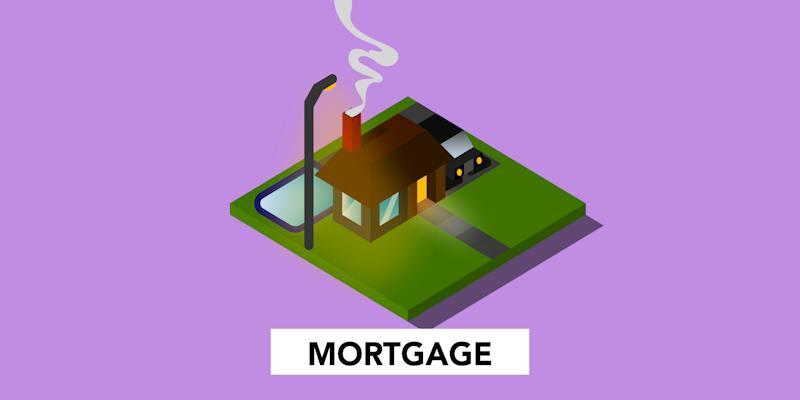Debt Consolidation and Homebuying Dreams: What You Need to Know
Jan 29, 2024 By Triston Martin
When seeking a greater favorable interest rate or genuinely wishing to streamline your monthly credit card and loan payments, consolidating your debts can be a prudent path of action. Nonetheless, if you are considering the purchase of a home imminently, this method necessitates meticulous timing. Debt consolidation loan bad credit can reduce the debt-to-income (DTI) ratio, which could positively impact credit scores and mortgage approval prospects. However, the process is not invariably clear-cut; the final result is significantly contingent upon the particulars of the fresh loan, encompassing its term and recurring monthly obligations.
How Debt Consolidation Can Impact Your Credit Score
Combining debts influences your credit rating in numerous approaches. While applying for a new mortgage, your credit reports may be thoroughly reviewed, decreasing your score. New credit score debts account for 10% of your FICO rating. But that is not the end. Your credit score score can improve if you make on-time consolidation loan payments. Payment records make up 35% of your FICO rating, making this vital.
In addition, paying off debt consolidation with bad credit with a consolidation loan will drastically decrease your credit utilization ratio. This may raise your FICO rating when considering that 30% of it's far primarily based on your debt-to-income score ratio. By consolidating your debts, you can organize the management of your financial obligations.
Mortgage Approval and the Role of Debt Consolidation
Mortgages for homebuyers require certain qualifications. Standard mortgages require a 3–5% down payment. 620 is the minimum credit score. Your DTI ratio is another lender factor. Less than 50% DTI is ideal. Compressing your debts may affect your debt-to-income ratio and mortgage eligibility. Combining debts can lower monthly payments. Many times, this lowers your interest rate.
Take this first step to lower your DTI, which makes you more appealing to mortgage lenders. Debt consolidation loan bad credit can backfire in the worst case. Monthly payments and debt-to-income ratios may increase for bad credit debt consolidation loans with shorter repayment periods. Check for the lowest monthly payment and longest term for a debt consolidation mortgage. By lowering your DTI ratio, you may become a better mortgage applicant. Paying extra without penalties is another good choice.
Considerations Before Consolidating Debt for a Mortgage
Assessing Your Credit Score
Your credit score should be checked before considering debt consolidation when house hunting. This score—an important indicator of financial health—is required for debt consolidation loan bad credit interest rates and terms. Based on Experian data, the average American credit score was 714 in 2022. Loan providers offer the best rates to borrowers with scores past 750. You may be able to negotiate favorable consolidation loan terms depending on your situation.
Getting Pre-qualified for Loans
After conducting a credit score inquiry, obtaining pre-approval for personal bad credit debt consolidation loans is advisable, particularly if one intends to use them for debt consolidation. Without affecting the borrowers' credit scores, this procedure entails lenders providing an advance notice of the potential loan terms, which may include monthly payments. Comparing options this way does not involve committing, much like a soft check. As loan pre-qualification assists borrowers in avoiding overborrowing and improving their financial management, the Consumer Financial Protection Bureau emphasized the significance of this step in 2023.
Comparing Monthly Payments
After you know the loan conditions, compare your current monthly payments to the consolidation loan's projected monthly payments. It is important to compare. According to a 2022 National Foundation for Credit Counseling study, consolidating debts reduced monthly payments by 20%.
Evaluating Your Debt-to-Income Ratio
Last, know your DTI ratio. Percentage of gross monthly income used to pay off debt each month. Lenders assess your payment management and debt repayment skills. Most lenders follow Fannie Mae guidelines and recommend a DTI ratio of 36% or lower for mortgage financing. Calculate your DTI after debt consolidation with bad credit to determine if you can afford a home.
Different Ways to Consolidate Debt
Personal Loan
Personal bad credit debt consolidation loans typically have a steady but challenging interest rate, monthly bills, and a repayment date. Reduced monthly payments improve your debt-to-income (DTI) ratio, making qualifying for a home or domestic loan less complicated. Personal loans may make it tougher to qualify for a mortgage with increasing month-to-month billings and outgoings. Obtain a DTI ratio-boosting balance without straining your budget. According to the Federal Reserve, a 24-month personal mortgage had an average interest rate of 9.58% in 2021, so loan terms are important.
Credit Card Balance Transfer
One alternative is to switch your residual balance to a credit card with a 0 percentage APR for up to 21 months. Although this method has a transfer fee, temporarily eliminating interest charges can lower monthly payments. The credit utilization ratio, which lenders consider when extending credit, can be reduced by this cut. You must keep your old cards balance-free to maximize the credit score boost. This option has fees; statistics show that the average balance transfer fee is 3–5%.
Home Equity Loan
A home equity mortgage can consolidate the money owed if you have a lot of equity. A domestic equity loan helps you to use your house's equity. Predominant mortgages and different domestic equity merchandise cannot exceed 85% of your home's fee. This method may be useful for homeowners, but handling repayments improperly could damage your property.
Tips for Debt Consolidation and Mortgage Management
1. Detailed Monthly Budget
To avoid debt, make and follow a monthly budget. To reduce paper use, many budgeting apps can help you track your spending and create a plan that fits your income. This approach lets you see your financial health in context and encourages money self-control.
2. Timely Payment of Bills
Bill payment punctuality is crucial to maintaining a good credit score, which is heavily influenced by payment history. Always pay bills on time or early if possible. Autopaying bills can help you avoid late payments. As the Federal Reserve states, late payments can lower your credit score by 100 points, making this practice crucial for financial health.
3. Steering Clear of New Debt
Credit cards often have no balance after debt consolidation with bad credit evaluation. However tempting, using them is foolish. Secure your credit cards to avoid impulse buys. However, keeping these accounts open can boost your credit utilization ratio, which affects your credit score.
On this page
How Debt Consolidation Can Impact Your Credit Score Mortgage Approval and the Role of Debt Consolidation Considerations Before Consolidating Debt for a Mortgage Assessing Your Credit Score Getting Pre-qualified for Loans Comparing Monthly Payments Evaluating Your Debt-to-Income Ratio Different Ways to Consolidate Debt Personal Loan Credit Card Balance Transfer Home Equity Loan Tips for Debt Consolidation and Mortgage Management 1. Detailed Monthly Budget 2. Timely Payment of Bills 3. Steering Clear of New Debt
Social Security Insurance Payment Schedule 2022
By Susan Kelly / Jan 03, 2024
This year, beneficiaries may expect an increase in their total Social Security benefits of 5.9 percent. This is owing to the cost of living adjustment being at its greatest level in over 40 years. The Social Security Administration was forced to raise payments to seniors by an average of $100 per month to compensate for rising prices caused by rising inflation as well as persisting restrictions in supply chains.

Debt Consolidation and Homebuying Dreams: What You Need to Know
By Triston Martin / Jan 29, 2024
Credit inquiries and new account openings can lower short-term creditworthiness, but debt consolidation may improve credit scores and impact homebuying. Read more.

How to Get a Mortgage for a Rental Property
By Triston Martin / Oct 26, 2023
Secure your financial future by learning about the ins and outs of getting a mortgage for a rental property. Don't be intimidated; find out how here!

Finding Out: Who Are Starbucks’ Main Competitors?
By Susan Kelly / Jan 15, 2024
The Seattle-based Starbucks Corporation opened its first store in 1971 and has since expanded to become the world's largest network of coffeehouses. Over 33,000 outlets (both owned and licenced) are already in operation for the brand, and they plan to increase that number to 55,000 by the year 2030. The United States is Starbucks' largest market, with 15,000 outlets, followed by China, where the business expects to open 6,000 locations.

Basis Points: Their Role in Financial Analysis:
By Triston Martin / Feb 05, 2024
Basis Points play a pivotal role in financial analysis, serving as a universal measure for changes in interest rates and other financial percentages. They provide investors with a precise, efficient way to track and compare differences in returns on various investments.

All You Need to Know About Gross Margin: Definition, Example, Formula, and How to Calculate it
By Triston Martin / May 19, 2024
This article provides a detailed overview of gross margin, its example, formula, and how you can calculate it.

Best Alternatives to Fidelity 2024 to Invest Your Money
By Triston Martin / May 11, 2024
Discover the best alternatives to Fidelity for your investment needs. Compare features and performance to make informed decisions.

SR-22 Insurance: Definition and Working in Detail
By Triston Martin / May 12, 2024
An SR 22 Insurance Missouri indicates you have the necessary insurance coverage. It helps restore driving privileges or license suspension.

Understanding the Consumer Price Index
By Susan Kelly / May 20, 2024
Learn how the Consumer Price Index (CPI) reflects inflation rates and leads economic decisions.

Why knowing your Net Worth is Important?
By Susan Kelly / Nov 01, 2023
You can't improve what you don't measure. Track your net worth and make informed financial decisions.

A Comprehensive Overview of MarketBeat vs Seeking Alpha 2024
By Triston Martin / May 20, 2024
MarketBeat and Seeking Alpha offer stock ratings, analysis, and sophisticated screening tools. They modify their offerings to suit investors' needs.

What is Active Income and How Does It Differ from Passive Income?
By Susan Kelly / May 18, 2024
Discover the ins and outs of active and passive income. Get insights, examples, and comparisons to help you manage your finances effectively.